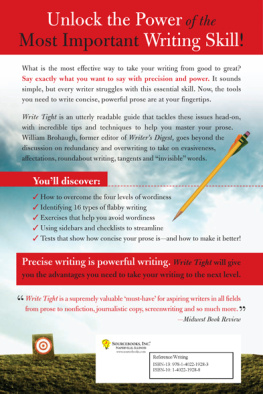All rights reserved. No part of this book may be reproduced in any form or by any electronic or mechanical means including information storage and retrieval systemsexcept in the case of brief quotations embodied in critical articles or reviewswithout permission in writing from its publisher, Sourcebooks, Inc.
This publication is designed to provide accurate and authoritative information in regard to the subject matter covered. It is sold with the understanding that the publisher is not engaged in rendering legal, accounting, or other professional service. If legal advice or other expert assistance is required, the services of a competent professional person should be sought.From a Declaration of Principles Jointly Adopted by a Committee of the American Bar Association and a Committee of Publishers and Associations
Published by Sourcebooks, Inc.
P.O. Box 4410, Naperville, Illinois 60567-4410
(630) 961-3900
Fax: (630) 961-2168
www.sourcebooks.com
Brohaugh, William.
Write tight : say exactly what you mean with precision and power / William Brohaugh.
p. cm.
Includes bibliographical references and index.
1. Authorship. 2. Editing. I. Title.
Printed and bound in the United States of America.
Foreword
WRITE TIGHT OR ELSE
by Lawrence Block
I n the summer of 1957 I was a nineteen-year-old kid in the process of becoming a writer. I had completed two years at Antioch College and had a story awaiting acceptance at a national publication. (It had actually been accepted, but they didnt want to tell me, because then they would have to pay me. I dont know that the phrase cash-flow problems had yet entered the language, but they were having them.)
I was spending the summer in New York, and I managed to land a job as an editor at the Scott Meredith Literary Agency. Scott represented a batch of respectable professional clients, but he never gave up collecting reading fees from wannabes; thats how hed started the business, and it brought in the bucks, and ethical considerations did not weigh heavily in his world.
So it was my job to read the stories that amateurs submitted, and to do one of three things: I could pass the story on to a higher-up, with my recommendation that we try to market it; I could return the story to its author with suggestions for revision; I could return it with an explanation of its faults, and the recommendation that he discard it and turn his attention to another story, to be submitted to uswith, of course, another fee.
I had a pretty good eye, and almost all of the stories I picked as keepers were approved and sent out and sold. One was a first novel we sold to Fawcett, the first place we sent it; the author was to write and publish quite a few more. Another was a confession story that felt right to me, and we sent it out that morning and sold it that afternoon. The woman who wrote it went on to become one of the top writers in that particular field, and later flourished as a romance novelist.
But I cant point to too many of these, because I approved at most a half of one percent of what I read. And, in the ten months I worked thereI took a years leave from college to keep that job, the experience was that valuableI did not return a single manuscript for revision. All but that half a percent went back, unsaleable and unfixable.
These fee clientsand that was the nicest thing we called thempaid $5 for a story of up to 5,000 words, $1 per thousand additional, and $25 for a booklength manuscript. My job, once Id established that we werent going to be submitting a given manuscript, was to write a report explaining why. For an ordinary story or article, the report ran to the bottom of page two; for a book, it filled four pages. With Scott, you got what you paid for, though it might not be what you had in mind.
And what did I get for all this? Experience, it goes without saying. Invaluable experience, because heres something you may not have realized: you can learn ever so much more reading bad writing than good. When its bad, you can see whats wrong with it. Reading really fine writing is like watching a superb magician; no matter how many times you watch his act, you still cant figure out how the hell he does it.
Thats what made me choose the job over another year at Antioch. But thats not all I got. I also got paid, and my compensation amounted to twenty dollars a week plus twenty percent of what the clients paid. I got a buck for the basic short story, five bucks for a book. I usually earned somewhere around eighty or ninety dollars a week, which was enough to live on if one didnt insist on living terribly well.
You can work out for yourself how much time I spent on the average manuscript.
R eading them was the easy part. I almost always knew, if not on the first page then within the first three pages, that the story was going back where it came from. I knew this because time after time the words lay there on the page, as lifeless as, if less inviting than, lox on a bagel. Sometimes a sentence would be so clumsy, so cumbersome, so unintentionally funny that one of us in the office would read it out loud. But that didnt happen very often, because when you read bad writing all day long it takes a great deal to make you smile.
Once I knew a story was not going to make the grade, I read the rest of it as quickly as possible, just skimming it so Id retain enough of the storyline to write about it. And then Id roll a sheet of our letterhead into my typewriter and assure the man or woman whod written it that the writing was just wonderful, but that profound and irreparable flaws in the plot itself were enough to render the story forever unsaleable.
There were two reasons for this. One was that Scott had written a book called Writing to Sell which explained successful writing in terms of what he called the plot skeleton. All of the letters we sent out talked about the plot skeleton, and of course every single one plugged the bejesus out of Scotts book. (It wasnt a terrible book. He got the plot skeletona strong, sympathetic lead character is faced with a problem, which through heroic effort he eventually solvesfrom Aristotle. The rest of the book, though, was a good deal more selfserving than anything Aristotle ever wrote.)
The plug was usefulScott wanted to sell booksbut an even more important reason to criticize the plot lay in the fact that a central plotting fault couldnt be ameliorated by rewriting. When we sent it back on those grounds, we were making sure wed never see it again.
And, because we praised the writing, we avoided discouraging the author. Turn your attention to a more promising plot, we coaxed. And send it in, along with another check.
The great bulk of what we saw was fiction, but our approach to nonfiction was not vastly different. If I was bouncing a magazine article, Id find something in the subject matter on which to hang my rejection.
Unconscionable, I must say. All of it. Those poor mopes could have taken a plot straight out of Chekhov or O. Henry, and wed have sent it back, praising the leaden prose and wooden dialogue while condemning the artful storyline.
Oh, now and then I might point up some stylistic element that wasnt so wonderful. I might suggest ways the writingthe superb writing, hey, dont get me wrongmight be made even better. But I didnt often take the trouble, and how was one to point out just which part of the silk purse smelled like a sows ear? So I took the easy way out. If Id been a better person, Id have had trouble living with myself.









